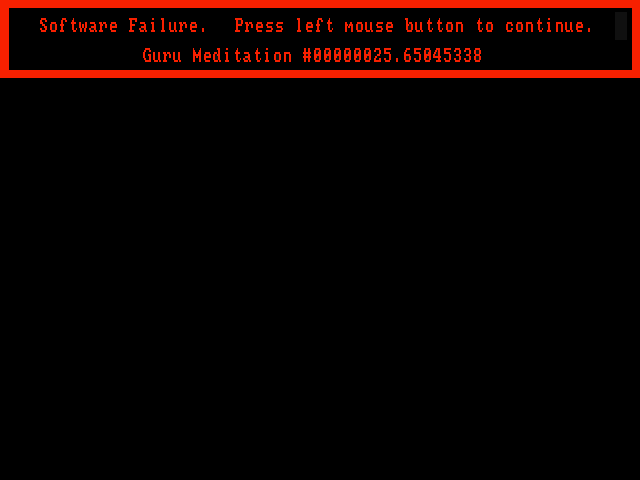Context capture, restart points and UX
A different perspective on error handling
Rolf W. Rasmussen
rolfwr.net
This is not a talk about control flow mechanisms
Too much time has been spent arguing about error return codes vs exceptions already
Nor is it a talk about log file formats and distributed logging protocols
Structured log formats and GELF is pretty neat, but that is beside the point
Nor is it a talk about colors, fonts, layout, spacing and animation
UX ≠ UI + animation
Why do we want to handle errors?
Let's look at a motivating example
What the world needs is a program for calculating remainders
Task: Write a program that reads two integers a and b prints the result of a modulo b.
Easy! I know C++!
#include <iostream>
int main() {
int a, b;
std::cin >> a;
std::cin >> b;
int remainder = a % b;
std::cout << remainder << std::endl;
}
What, if anything, is wrong with this code?
See, it works

User testing: The author

User testing: The astronomer

User testing: The mathematician

“Black holes are where God divided by zero”
“Black holes are where God divided by zero”
— Steven Wright, comedian
No, this is not an Einstein quote, despite what you read on the internet.
Platform testing: Amiga

The test engineer everyone fears

Issue triage
How would you deal with these reported issues?
| Author: Fails when using Chicago Manual of Style which spells out single digits. | FR/UX/CC |
| Astronomer: Sun to Saturn distrance in meters gives wrong AU remainder | B/UX/FR |
| Mathematician: I need a domain and codomain of ℤ, not significand × 2exponent | UX/CC |
| Mathematician: Sign should be equal to divisor, not dividend. See Mathematica. | Doc/FR |
| Dinosaur: Sometimes crashes and reboots our salary processing machine | B/RP |
| Tester: Inconsistent error messages under low memory conditions | Doc |
| Junior dev: Unable to reproduce reported crash. Can we add logging? | CC |
| Trekkie: The core should only be dumped in the event of a warp core breach | Joke |
| UI designer: Technical error messages are confusing and scary. Hide them. | UX |
| UX designer: User would benefit from seeing preview of results while he types | UX/RP |
Isolation through restart points
When a failure occurs, abort the directly affected activity. Let other isolated activities continue running.
OS process scheduler as restart point
Most modern OSes provide process isolation.
Use one process browser per tab
Service managers as restart points
Service managers like Linux systemd, macOS launchd, and Windows Service Manager provides the ability to restart service processes if they fail.
Application loops as restart points
If an application performs many independent tasks then it often makes sense to allow unaffected tasks to run to completion even if one of the tasks fail.
- Each incoming request in a server could be considered a separate task.
- Each file copy operation in a backup program could be considered a separate task.
- Each HTTP GET request in a webcrawler could be considered a separate task.
Restarting integer acquisition
int acquire_int() {
while (true) {
try {
return request_int();
} catch (const parse_error& err) {
print_error(err.what(), err.state);
}
std::cout << "Try entering an integer value again." <<
std::endl;
}
}
Modified main function
int main() {
int a = acquire_int();
int b = acquire_int();
if (b == 0) {
std::cout << "Remainder undefined when dividing by "
"zero." << std::endl;
} else {
int remainder = a % b;
std::cout << remainder << std::endl;
}
}
Multiple layers of restart points
Imagine a modern HTTP server running as a service
- If the server process fails, then the service manager restarts it
- If an accepted network connection fails, the accept loop will continue to accept new connections
- If HTTP request handler fails, an error will be send back, and the HTTP protocol parser will continue to process requests on the connection.
The biggest sin in error handling is corrupting state or result
If you can't isolate the error, then don't continue
Memory and data corruption side-effects are be very hard to debug when visible failure occur long after the initial error.
Restart ≠ Unsolicited retry
For low-level code code the most useful behavior is to fail fast on error.
Only do retries at the outermost context. In interactive applications, the user should be kept in the loop.
Implementing retry logic at multiple layers causes unwanted delay amplification and catastrophic cascades.
Don't retry operations that encounter permanent errors
Duh.
“Insanity Is Doing the Same Thing Over and Over Again and Expecting Different Results”
“Insanity Is Doing the Same Thing Over and Over Again and Expecting Different Results”
— Anonymous Al-Anon attendee
(probably)
Still not an Einstein quote, despite what the internet says.
Context Capture
As you abort an activity and pass the error condition up to outer contexts, don't throw away the the information only known by the inner contexts.
Examples of things to capture
- The URL of the failed HTTP request
- The path of the file that could not be found
- The arguments and the mathematical operation that failed due to division by zero
- The line in the configuration file whose value did not work
Context capture layers
Each layer of context may potentially contribute to the description of the error condition, contributing higher level information in the outer layers.
- What API call failed and why it failed.
- What calling the API was trying to achieve.
- What high level operation or task that was aborted as a result.
- How, with what input, and why the high level operation was started in the first place.
The second biggest sin is discarding valuable information
They lossy propagation problem
Context information is frequently lost when propagating the error condition from the lower levels of a system to the higher levels of the system.
- Throwing away information
- Not augmenting the error information with context that only intermediate layers know
Capturing integer parsing errors
int parse_int(parser_state& state) {
skip_whitespace(state);
int sign = parse_optional_sign(state);
auto digit = parse_digit(state);
if (!digit) {
throw parse_error("Expected integer digit.", state);
}
int value = 0;
do {
value = value * 10 + sign * digit.value();
if (value != 0 && ((value < 0) != (sign < 0))) {
std::ostringstream oss;
oss << "Only integers between " << std::numeric_limits<int>::min() <<
" and " << std::numeric_limits<int>::max() << " are supported.";
throw parse_error(oss.str().c_str(), state);
}
digit = parse_digit(state);
skip_whitespace(state);
} while (digit);
if (state.pos != state.line.size()) {
throw parse_error("Unexpected character.", state);
}
return value;
}
Captured context data
struct parser_state {
std::string line;
size_t pos;
};
struct parse_error : public std::runtime_error {
parser_state state;
parse_error(const char* what,
const parser_state& error_state)
: std::runtime_error(what), state(error_state)
{
}
};
I Have No Mouth, and I Must Scream
What do we do when we're forced to implement an interface that does not allow us to report back all the error information that we have?
Side channels!
Side channels
Examples of standard side channels:
| errno | Posix API |
|---|---|
| SetLastError() | Windows Win32 API |
| Log files | Common practice |
| Process dump files | Common OS mechanism |
Thread Local Storage is often used to create ad-hoc side-channels.
Corralation IDs
A unique identifier given to an ongoing activity that is provided both in main reporting channels and side channels to allow corralation of information passed through each channel.
Pass corralation IDs across network boundaries.
Error codes
Identifiers you can paste into Google to find other people complaining about the same problem.
UX and DX
| UX | The User Experience of users that just want to get on with his work with as little fuzz as possible experiences when an error occurs. |
|---|---|
| DX | The Developer Experience of developers that are trying to diagnose and possibly eliminate errors that have been reported. |
Don't confuse the two. Don't communicate with the user through log files.
UX: What users would like to know
- Is it worth trying again later?
- What is the current state of my work and the operation I tried to do?
- What aspect of what I tried to do triggered the problem?
- Is there anything I can do to make the problem go away?
- If I need a developer to look at the problem, what do I tell them to look for?
Cop outs
- Try again later.
- Contact your system administrator.
Translation: The UI layer has no idea what happened.
UX is not putting lipstick on a pig
Good UX requires often improving context capturing.
Actionable conditions
- If something is missing, guide the user to provide the information
- If some input or setting is wrong, guide the user to fix it
- If something needs to be installed or upgraded, help the user do so
- If the user lacks permission, help the user request permission from the right person
Explaining problems to the user
void print_error(const std::string& message,
const parser_state& state)
{
std::cerr << message << std::endl;
std::cerr << " " << state.line << std::endl;
std::cerr << std::string(4 + state.pos, ' ') << "^" <<
std::endl;
}
User testing

Expected API errors are not application errors
Uninitialized, incomplete or unfinished are common states which users don't consider an error.
“A clever person solves a problem. A wise person avoids it.”
“A clever person solves a problem. A wise person avoids it.”
— Anonymous
“I never said half the crap people said I did.”
— Albert Einstein
Graceful degrade
Make the best of what you've got.
Don't close down the restaurant when you run out of parsley
Questions?
Bonus slides...
Parsing helpers
void skip_whitespace(parser_state& state) {
while (state.pos < state.line.size() && state.line[state.pos] == ' ') {
++state.pos;
}
}
int parse_optional_sign(parser_state& state) {
if (state.pos < state.line.size() && state.line[state.pos] == '-') {
++state.pos;
return -1;
}
return 1;
}
std::optional<int> parse_digit(parser_state& state) {
if (state.pos < state.line.size()) {
char c = state.line[state.pos];
if (c >= '0' && c <= '9') {
++state.pos;
return c - '0';
}
}
return std::nullopt;
}
The remaining code
#include <iostream>
#include <ostream>
#include <limits>
#include <string>
#include <optional>
#include <sstream>
int request_int() {
parser_state state {};
std::getline(std::cin, state.line);
return parse_int(state);
}
API contracts
Context Capture behavior effectively becomes part of the API as soon as outer layers start depending on it.